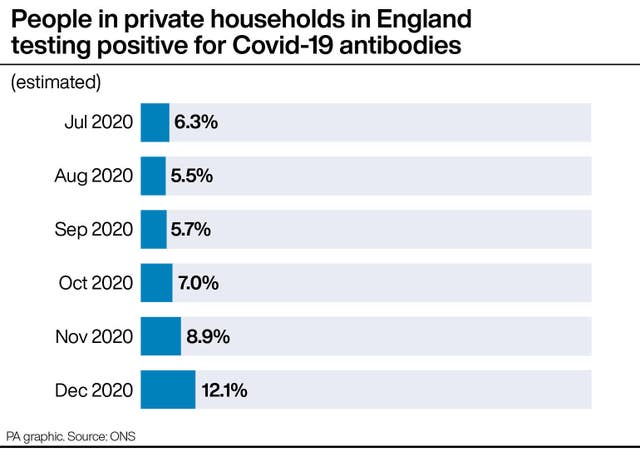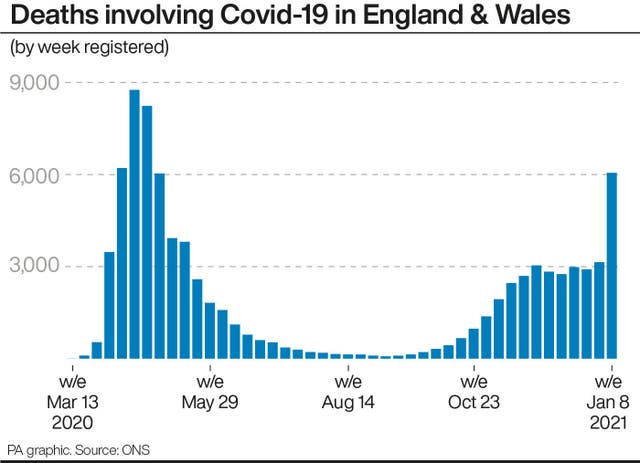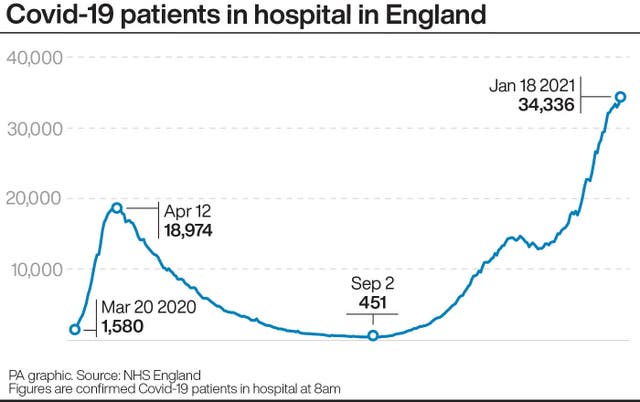One in eight people in England has had Covid-19, new figures suggest
The figure is one in 10 in Wales, one in 13 in Northern Ireland and one in 11 in Scotland, according to the ONS’s Covid-19 Infection Survey.

An estimated one in eight people in England would have tested positive for antibodies to Covid-19 by December last year, up from one in 14 in October, new figures show.
Antibody data on infection in private households suggests that one in 10 in Wales had also been infected by December, alongside one in 13 in Northern Ireland and one in 11 in Scotland.
The figures come from the Office for National Statistic’s Covid-19 Infection Survey in partnership with the University of Oxford, University of Manchester, Public Health England and Wellcome Trust.

They are based on the proportion of the population who are likely to have tested positive for antibodies to Covid-19, based on blood test results from a sample of people aged 16 and over, but do not reflect all the people who have had coronavirus and do not take account of antibodies waning over time.
The ONS found “substantial variation” between regions in England, with 17% of people in private households in Yorkshire and the Humber estimated to have tested positive for antibodies in December, compared with 5% in south-west England.
In London, the figure was 16% in December, up from 11% in October, while it was 15% in the North West, up from 6% in October.
In the West Midlands, 14% have had Covid, up from 8% in October, while 8% in the South East and the East of England have had the virus, both up from 5% in October.
The study came as Health Secretary Matt Hancock revealed he is self-isolating after receiving an alert through the NHS Covid-19 app.
In a video posted on Twitter, he said: “Last night I was pinged by the NHS coronavirus app, so that means I’ll be self-isolating at home, not leaving the house at all until Sunday.”
Mr Hancock, who has previously had coronavirus, said self-isolating is important because it is “how we break the chains of transmission”.
Meanwhile, some family doctors continue to express their frustration about the rollout of vaccines across the UK.
The latest figures showed 4,133,720 people in England, Scotland and Wales have received a first dose of vaccine.

With more than half of the over-80s and half of elderly care home residents having received the jab, ministers have now given the go-ahead to begin vaccinating the next priority groups – the over-70s and the clinically extremely vulnerable.
Northern Ireland Secretary Brandon Lewis said “there will be an overlap” between those in the first group getting their jab and those in the second as the NHS keeps up the momentum of the vaccine rollout.
He told LBC radio: “We’re very clear that areas should be getting through the majority of the first cohort before they move on to the second cohort, but there will be an overlap.
“The reality is, as you’re moving through these, as you start to bring the second cohort in, there will be a bit of an overlap.
“So, while they’re still finishing cohort one, some people from the second cohort will be having their vaccines and being contacted.
“That’s understandable because the other alternative is you get through cohort one and you pause before you can start getting cohort two in and that would be wrong.
“In order to keep things flowing and moving we will see some overlap, but areas should be getting through the majority of cohort one before they start moving to cohort two.”
On Monday night, Mr Hancock acknowledged that some parts of the country had made better progress than others in vaccinating those in the top priority group, but said more supplies of the vaccine are being pumped to areas that have fallen behind.
Nevertheless, some GPs have taken to social media saying they are “crying out for more vaccines” and that their elderly patients want to be vaccinated in local surgeries rather than having to travel further afield to mass centres.
Speaking on BBC Breakfast on Tuesday, family GP Dr David Holwell said it is “disappointing” that the number of vaccines being given in his area has fallen because of a lack of supplies.
The doctor said that in his part of West Sussex they had been doing 2,000 vaccinations a week but only received 300 doses last week.
He said: “We were doing an average of about 2,000 vaccines a week, then last week we got 300 and this week we will get 800, so it’s disappointing.”
The Government believes it is still on track to vaccinate around 15 million high-priority people across the UK by February 15.
Once those vaccines have taken effect, around two to three weeks later ministers will consider whether lockdown measures can be eased in England.

Despite pressure from Tory MPs to move as quickly as possible, Prime Minister Boris Johnson has warned there will be no “open sesame” moment when restrictions will all be lifted together.
Elsewhere:
– Wales’s health minister, Vaughan Gething, said 70% of care home residents and staff in the country should have received a Covid-19 vaccine by the end of this week. He expects over-70s in Wales to be invited for their vaccinations “in the near future”.
– ONS figures show that more than a quarter of all care home deaths in England and Wales registered in the week ending January 8 involved coronavirus – 960 out of 3,395.
– Metropolitan Police Commissioner Dame Cressida Dick has said she is “baffled” why frontline officers are not closer to the front of the queue to receive a vaccine.
– Figures from the Department for Education show 21% of primary school pupils were on-site last week, while 5% of secondary school students were in class.
Elsewhere, Professor Janet Lord, director of the Institute of Inflammation and Ageing at the University of Birmingham, urged caution among those who have already been vaccinated.
Asked whether people who have received the jab can hug their children, she told BBC Radio 4’s Today programme: “I would certainly advise not to do that at the moment because, as you probably know, with the vaccines they take several weeks before they are maximally effective.
“It’s really important that people stay on their guard even if they’ve had that first vaccination.”
She also warned against the idea of a coronavirus immunity passport until more is known about transmission of the virus among those who have been vaccinated.
However, Professor Julian Savulescu, director of the Oxford Uehiro Centre for Practical Ethics, said those who have proven immunity should not be restrained.
“There’s a serious ethical issue that you’re only entitled to restrict people’s liberty in a liberal society if they represent a threat to other people,” he told the Today programme.
“Carrying a virus is like carrying a loaded gun that can go off accidentally.
“We’re entitled to restrain people and check whether they have a gun, but, if they don’t have a gun, to restrain them, that’s false imprisonment.”
He added that efforts should be made to allow those with “certain immunity” to return to work and normal life.





